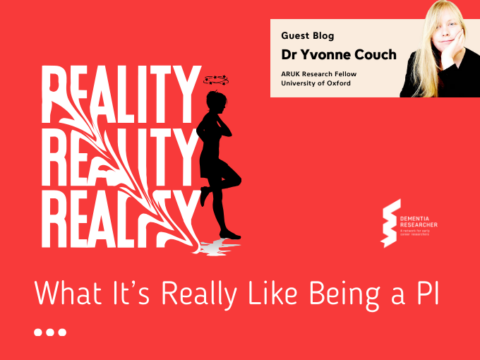My name is Megan Polden, and I am a postdoctoral researcher at the University of Liverpool. Dementia has always been a key focus throughout my research career. Ever since I was 18, I knew that I wanted to work and, in some way, help people living with dementia and their families. While at University, I volunteered at various brain injury units and dementia care homes. I had the honour of meeting many incredibly inspiring people living with dementia and their families, and this only further motivated me to focus my research on improving the lives of people living with dementia.
My PhD focused on examining working memory and inhibitory control processes of people living with Dementia and using eye tracking techniques to measure these processes. Early diagnosis of dementia can lead to more effective treatment plans and support for people living with dementia. Our key aim was to assess if eye tracking could be used as an early and non-invasive biomarker for cognitive decline to help improve dementia diagnosis. Our results showed promising results for the use of eye tracking in the diagnosis of cognitive impairment however further research is needed to determine the specificity and sensitivity of the methods.
After completing my PhD, I was awarded a two-year research fellowship funded by the NIHR and the Alzheimer’s Society, allowing me to examine singing and dancing support services and their impacts on people living with dementia and their carers. I am just starting my postdoc now! There are limited benefits of pharmacological interventions, particularly for behavioural symptoms in dementia and because of this, there is a strong need for non-pharmacological support services such as singing and dancing interventions. Music therapy and singing interventions can lead to improvements in mood and reductions in anxiety as well as help to maintain speech and language and enhance people’s quality of life. Music and singing interventions also have positive impacts on carers by relieving stress, enhancing mood and reducing carer burden when sessions are attended together. Singing combines, music and instinctive behaviour to stimulate the brain and group singing interventions may help to improve social interaction between people living with dementia by promoting relaxation and reducing levels of anxiety.
To date, evaluations of group-based singing interventions for people living with dementia have mainly focused on impacts on the person living with dementia and overlooked potential impacts on their carers. Evaluations have largely been carried out in residential care home settings with people who have more advanced dementia rather than in community settings and have primarily focused on the musical aspects rather than social components. Additionally, it is evident that singing interventions can be extremely beneficial to people living with dementia however, the effects of both singing and physically engaging dancing groups for both the person with dementia and their carers have not been extensively examined. Combining singing and dancing could lead to even more benefits from these services for people living with dementia.
During my post-doc, I have the pleasure of working alongside NIHR Dementia Researcher blogger Dr Clarissa Giebel, Dr Kerry Hanna, and Prof Carol Holland and in collaboration with The Brain Charity and Lyrics and Lunch. Our main aim is to examine the effects of singing intervention services on mood, quality of life, cognition and social isolation for people living with dementia and their carers. Additionally, we are aware that accessing services after a diagnosis can be difficult and inequalities had been reported in accessing social care and support for people living with dementia and their carers. Factors that contribute to poor access include the cost of care/services, unequal services available, transport issues and increased reliance on others (unpaid carers) for support. A further focus of our research will be to look at the barriers that people encounter when trying to engage with these support services and look at ways to reduce these factors and improve engagement. Understanding the benefits of support services and how to make them as widely and easily accessible as possible is important and something we hope to improve through this research. Singing interventions and support services have many positive impacts on both people living with dementia and their carers and we hope our research can emphasise the benefits and positive impacts of these services.
I am hopeful that throughout my post-doc I can continue to expand my knowledge of dementia support services and delivery and how to optimise effectiveness and accessibility. I hope to gain further experience writing grant applications and developing research protocols. I am hopeful that during the two years, I will meet many fellow dementia researchers and establish the foundations for future research collaborations, including via the Liverpool Dementia & Ageing Research Forum. Towards the end of my post-doc, I will strive to attain further research funding with the hope to progress this research and continue working in the field of dementia research.

Dr Megan Polden
Author
Dr Megan Polden is a Postdoctoral Research Associate at University of Liverpool and University of Lancaster, currently researching the effectiveness and accessibility of singing and dancing intervention services for people living with dementia. Megan completed her undergraduate degree, masters and PhD at Lancaster University. Her PhD examined memory and inhibitory control processes in Alzheimer’s Disease and mild cognitive impairment and examining whether eye tracking could be an effective method to measure these processes.

 Print This Post
Print This Post




